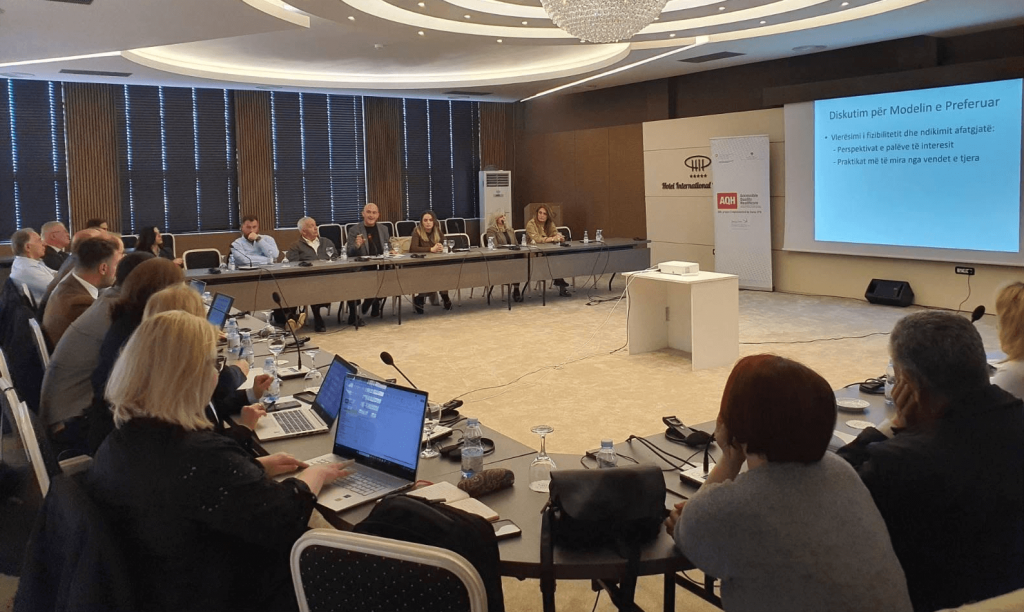On April 14, 2025, Accessible Quality Healthcare (AQH) organized a one-day workshop bringing together key stakeholders from national and local levels across Kosovo. The workshop presented findings from an assessment of six Patient Councils (PCs) in Rahovec, Lipjan, Mitrovica, Obiliq, Vitia, and Drenas, municipalities where councils have been active for over a year. To date, nine PCs have been established, with two more being in the initiation phase. The workshop also highlighted legal pathways to further strengthen the role of PCs in Kosovo’s healthcare system.
Patient Councils play a key role in supporting patients and bridging the gap between communities and healthcare providers by helping address complaints, raising awareness on health issues, advocating for marginalized groups, and collaborating with local institutions.
Led by experts Mr. Dardan Kryeziu and Mr. Artan Murati, the event facilitated open dialogue on how to institutionalize and sustain the work of Patient Councils (PCs), including the feasibility of establishing formal legal frameworks. It brought together representatives from the Ministry of Health, municipal Directors of Health and Social Welfare, Directors of Main Family Medicine Centers, one PC representative from each of the six municipalities involved in the assessment, as well as stakeholders from Patients’ Rights Association of Kosovo (PRAK), Integrated Health Services (IHS), and AQH.
The discussions reinforced the importance of community-based mechanisms that ensure patients’ voices are heard and reflected in the improvement of healthcare services.
Some of the key information from the report are:
Current State of Patient Councils in Kosovo
- Patient Councils (PCs) have been established in 9 municipalities (Rahovec, Lipjan, Mitrovica, Obiliq, Vitia, Drenas, Prizren, Ferizaj & Kaçanik) with support from PRAK and AQH. 2 more are in the initiation phase.
- Councils play a key role in representing patient voices, addressing complaints, promoting healthcare transparency, and raising awareness.
- PCs in Kosovo lack formal legal recognition and operate without a dedicated legislative framework.
- They function through voluntary efforts, and ad-hoc collaboration with healthcare institutions.
- They function with limited authority and inconsistent structures, often influenced by the willingness of Primary Healthcare Centers (PHCs) and municipalities.
- Capacity-building efforts have been conducted by AQH and PRAK to strengthen member skills in patient rights, complaint handling, and public advocacy.
- Some PCs have gained voting rights in PHC Steering Boards (e.g., Rahovec, Mitrovica, Drenas), while others participate as observers.
- Public awareness is growing slowly and still many citizens are unaware of the councils’ existence and role.
- Efforts have been made to engage marginalized populations, people with disabilities, rural residents, women, children & the elderly especially in Rahovec, Obiliq, Lipjan, and Drenas.
Challenges Identified
- Lack of formal legal recognition, limiting authority and sustainability.
- No sustainable funding; councils operate on a voluntary basis.
- Low public awareness and engagement.
- Difficulty retaining members due to lack of incentives and formal support.
- Dependence on municipal goodwill and PHC leadership.
- No national strategy for long-term sustainability or standardization.
What needs to happen?
- Adopt a national regulation to legally recognize Patient Councils, defining their roles and integration into healthcare centers.
- Ensure sustainable financing through a hybrid model combining public budget and donors.
- Establish uniform complaint handling procedures by developing standardized guidelines for Patient Councils to monitor and address patient complaints within the Quality Management System.
- Increase public awareness of Patient Councils’ roles.
- Strengthen Patient Councils’ role in healthcare governance by ensuring their representation with voting rights on MFMC Boards and clarifying their advisory responsibilities in healthcare decision-making.
The workshop was an important step toward opening discussions on formally integrating Patient Councils into Kosovo’s healthcare system. Moving forward, it is essential to support Patient Councils so they can continue representing communities and improving healthcare for everyone.



